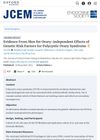Immunological and Metabolic Causes of Infertility in Polycystic Ovary Syndrome
May 2023
in “
Biomedicines
”
Polycystic Ovary Syndrome PCOS insulin resistance hyperandrogenism chronic inflammation autoimmunity progesterone deficiency leptin hypoadiponectinemia triglycerides free fatty acids oxidative stress inflammatory mediators estrogen progesterone high androgen levels autoimmune disorders low progesterone low adiponectin

TLDR PCOS causes infertility mainly due to hormonal imbalances, insulin resistance, and chronic inflammation.
Polycystic Ovary Syndrome (PCOS) is a complex condition leading to infertility due to a combination of immunological, metabolic, and endocrine disorders. The main factors causing infertility in PCOS are impaired ovulation, implantation issues, and low-grade inflammation. Insulin resistance, hyperandrogenism, chronic inflammation, autoimmunity, and progesterone deficiency are the basis of fertility disorders in PCOS. Obesity can exacerbate these issues, leading to increased leptin concentration, hypoadiponectinemia, high concentration of triglycerides and free fatty acids in ovarian follicular fluid, and the presence of oxidative stress and inflammatory mediators. Chronic, low-grade inflammation and oxidative stress in ovarian cells negatively impact fertility. Progesterone, an immunomodulating hormone, plays a key role in reproduction, and its chronic deficiency in women with PCOS is a significant cause of infertility. The balance between estrogen and progesterone is crucial for maintaining fertility and inhibiting autoimmune reactions. The treatment of infertility in PCOS should involve interdisciplinary teams of specialists for accurate diagnosis and effective therapy.












